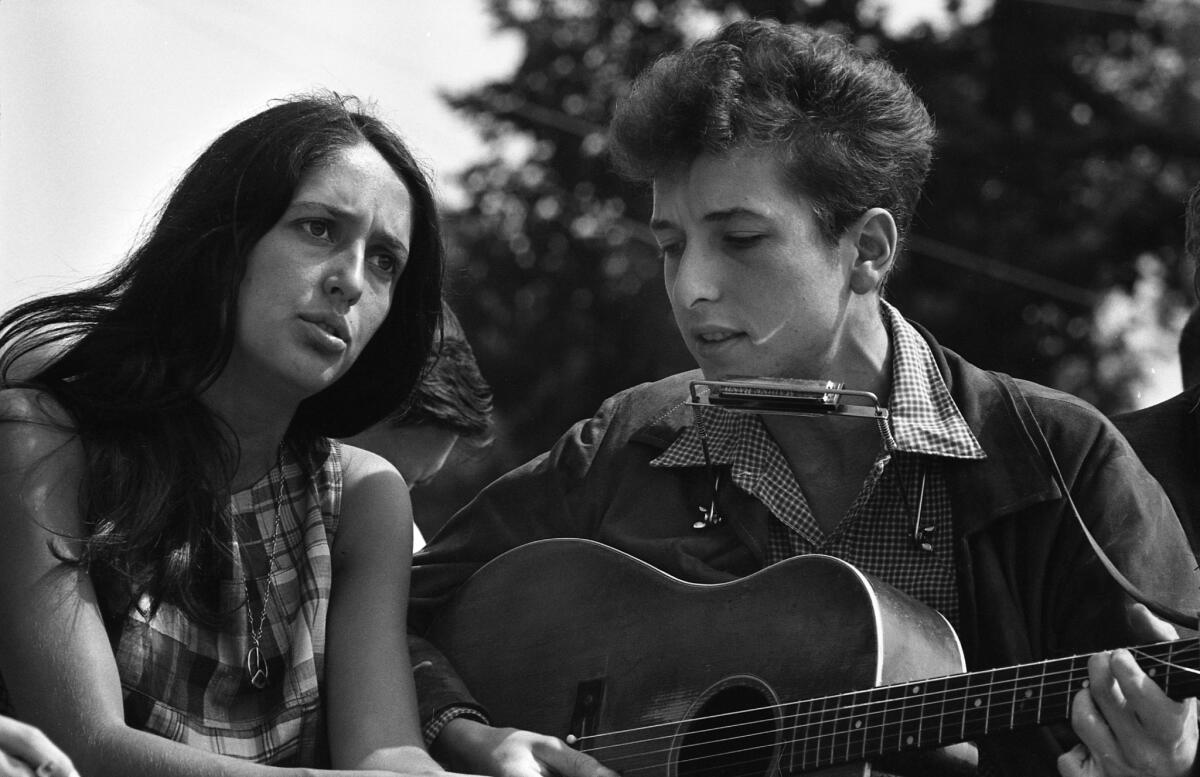When Bob Dylan met Walt Whitman

Walt Whitman might have gotten a good laugh out of this. I know I did. I mention Whitman because of a recent incident at the rest stop on the New Jersey Turnpike named after him, a place offering food that didn’t exist in Whitman’s time and a stream of vehicles that would have terrified the most American of our poets, a versifier who dreamed of our nation’s lofty promises and luscious possibilities.
One thing Whitman didn’t dream about was how, more than a century after his death, a pit stop along a massive highway would affirm my pet peeve about the cultural and historical amnesia of Americans. While waiting in line to pay for a candy bar, I heard the usual music that’s piped into these places: Carole King, Elton John and, of course, Bruce Springsteen, the poet laureate of the Garden State. Then came a voice halfway between singing and droning, and that really didn’t seem to care which it was doing as long as it got the point across that something was amiss in our country:
Oxford Town, Oxford Town
Everybody’s got their hats bowed down
The sun don’t shine above the ground
Ain’t a-goin’ down to Oxford Town
This was Bob Dylan singing “Oxford Town” — a dirge about the riots that engulfed the University of Mississippi when its first black student, James Meredith, enrolled in October 1962. If any singer doesn’t belong in a rest stop — if any singer doesn’t aspire to help us rest — it’s Dylan. Since his early days, Dylan’s been out to provoke, stir, annoy, amuse, titillate. The song coming through the loudspeakers was seditious and subversive: “Guns and clubs followed him down, All because his face was brown, Better get away from Oxford Town.”
Yet no one at the rest stop seemed to notice. I asked my daughter if she knew the song. I got a shrug. I asked the cashier the same question. I got a stare. Both are in their early 30s.
But “Oxford Town” isn’t just a ditty to fill up the aura space alongside a major highway. It’s a remembrance of days gone by in the Deep South, not the South of Stephen Foster when all the world was sad and weary, but the South of rage and blood. Before Meredith could enter his first classroom at Ole Miss, two men were killed and more than 200 soldiers, National Guardsmen and U.S. marshals were injured. These men weren’t wishing they were in Dixie. They wanted to get the hell out of it.
A few weeks ago, we commemorated the 50th anniversary of the civil rights March on Washington. Next month is the 51st anniversary of the riot at Ole Miss. William Faulkner, who lived in Oxford, famously wrote: “The past is never dead. It’s not even past.” That’s true — most of the time. The past is past — a temporal corpse, if you will — when we’ve never heard of it, when the events that preceded us are unknown or long forgotten, when the demands of today push out the whispers and lessons of yesterday.
Americans are notoriously lax about their past. Between 1943 and 2011, at least seven national studies concluded that American students “do poorly” in history, “know little” about history, are “ignorant” about history. A 2011 survey, for instance, found that only 20% of fourth-graders could identify Abraham Lincoln, and they had no idea why he was important. This was similar to a 1943 study that found only 22% of the high school student respondents knew even two of Lincoln’s achievements as president.
In this country, historical literacy is elusive. It probably never existed. So I shouldn’t have been surprised when Dylan’s song raised barely an eyebrow at the Walt Whitman rest stop. But maybe that would have been fine with Whitman. In his poem, “To a Historian,” Whitman dismissed those “who celebrate bygones” and treat “man as the creature of politics, aggregates, rulers and priests.”
“Pressing the pulse of the life,” Whitman — that indefatigable celebrator of the self and of himself — believed he possessed the power to outline “what is yet to be” and “project the history of the future.”
For the poet, every man was his own historian and every man created his own history. But time and history don’t come full blown from this instant. They gestate and mature, circling back on themselves to find the tangled roots of their origins. That’s why I find solace in this line of Dylan’s song: “Somebody better investigate soon.”
Dylan was talking about the “two men [who] died ‘neath the Mississippi moon.” I’m talking about the holes in our heads where even our recent history is missing, turning our present into a mystery and the mystery into a blur.
Arthur J. Magida is writer-in-residence at the University of Baltimore. His most recent book is “The Nazi Séance.”
More to Read
A cure for the common opinion
Get thought-provoking perspectives with our weekly newsletter.
You may occasionally receive promotional content from the Los Angeles Times.










